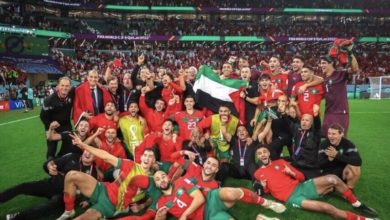The 2006 World Cup in Germany gripped the attention of millions around the world. Soccer is the “world’s sport” and, although it has yet to break into this country’s sports mainstream, television ratings were surprisingly high in the United States.
There has been a great deal of media coverage of the headbutt that French squad captain Zinedine Zidane laid on the
 |
Zidane’s attack on Materazzi comes after years of scorn for professional soccer players of African descent in Europe, where they often face vicious racist attacks by white European players, fans and right-wing politicians. The multinational composition of France’s team has been a source of frustration for the fascist wing of the French ruling class for years.
Of the 22 players on the French squad, 16 were either born in Africa or came from families of African origin. This is nothing new for “Les Bleus”—the nickname of the French team—which won the 1998 World Cup with a similarly diverse squad.
Why is France’s team so diverse?
French soccer star Zinedine Zidane was born in France in the 1970s. His parents emigrated from Algeria in the 1950s. Countless French workers hail from North African backgrounds.
For centuries, France was one of the most brutal and powerful colonial empires in the world with colonies ranging from the Americas to Africa to Southeast Asia. After World War II, thousands of workers from the French colony of Algeria were encouraged to immigrate to France so that they could fill labor shortages. These immigrants were initially granted certain rights and privileges afforded only to the “fully French,” but this didn’t last long.
Working-class neighborhoods populated by immigrants from Algeria and other North African countries began to show solidarity with resistance movements in their home countries, especially Algeria. In response, the French government repressed the immigrants. Hundreds were killed and jailed in France as hundreds of thousands were killed by the French occupiers in Algeria.
Ultimately, the Algerian people won their independence from France. By that time, the working class in the colonial power, France, had been injected with many thousands of immigrants from colonized countries.
Immigrant rebellion
When the French won the 1998 World Cup, the government and liberal commentators spun it as a triumph of France’s racial diversity. They hailed the sporting victory as a sign that racism was receding countrywide. Unfortunately, it wasn’t true.
France’s capitalist class, like in all other capitalist countries, relies on spreading racism to divide workers and maintain class rule. Some capitalist elements are more open about their motives than others. The head of France’s ultra-right National Front party, Jean Marie Le Pen, said that the French team was “artificial” because of multi-racial character of the team.
Institutional racism against Arab and African immigrants has resurfaced many times both on and off the soccer field in the years that followed.
This all came to a head in October 2005 after two North African teenagers were chased by French police and
 |
The death of the two teens sparked the rebellion, but behind it was France’s colonial legacy and decades of immigrants suffering racism and indignity. France’s unemployment rate is roughly 10 percent nationally. In the predominantly immigrant suburbs, the rate is much higher. Workers there are subject to difficult living conditions, poverty and intense racism from the police and white population.
The success of North African and other immigrants in professional soccer is not a testament to French diversity. Soccer boarding schools, operated by professional soccer clubs, are some of the few escapes for immigrant youth from the poor housing projects. Nine players from the French team were raised in these working-class suburbs.
“In the eyes of most of the French, we immigrants are only welcome if the national team wins the World Cup,” said Badir a 22 year old worker in France. “But even if we win, after a couple of days we are back to position zero—no jobs, no housing, no chances.”
Racism in European soccer
In contrast to France’s team, Italy fielded an all-white squad. Marco Materazzi, the Italian player headbutted by Zidane, also plays for the Italian pro team Lazio. Lazio’s hardcore fan club, “the Ultras,” is infamous for its fascist politics and overtly racist behavior. “The Ultras” recruit people to ultra-right political groups in Italy. They have displayed racist banners at matches calling opposing players “n*****s” and frequently make racist chants and monkey sounds at opposing players of African descent.
The racist behavior of “the Ultras” is not isolated. Racism has become and increasing problem in European pro soccer, where banana peels and nuts are often thrown at players of African descent across Europe’s pro leagues.
In that context, let’s examine the much-discussed headbutt incident involving Zidane and Materazzi.
During the closing minutes of a tied match in the World Cup final, Marco Materazzi appeared to exchange words with Zidane. Zidane suddenly turned and headbutted Materazzi in the chest, knocking him to the ground. Zidane then was issued a red card and expelled from the match, becoming the first captain in World Cup history to be expelled from a finals match.
This incident was the end of Zidane’s illustrious career. He retired after the tournament. During his career, he guided France to a World Cup championship, a World Cup finals match and, along the way he twice defeated Brazil, the world soccer superpower. How could one of the greatest players of his generation end his career like this?
Clearly, he was provoked, but Materazzi’s exact words to Zidane have yet to be confirmed. Some major television networks hired lip readers to replay the footage and asserted that Materazzi called Zidane a “dirty terrorist.” Others say Materazzi called Zidane’s sister a “whore.” Materazzi has refused to reveal what he said.
Whatever he said to Zidane, it’s clear that players like Zidane in European pro soccer that come from oppressed backgrounds face racism on and off the field. The stir and speculation surrounding the headbutt have highlighted this racism for millions around the world to see. Racism on the soccer field only mirrors the racism experienced by immigrant workers and their families throughout Europe.





